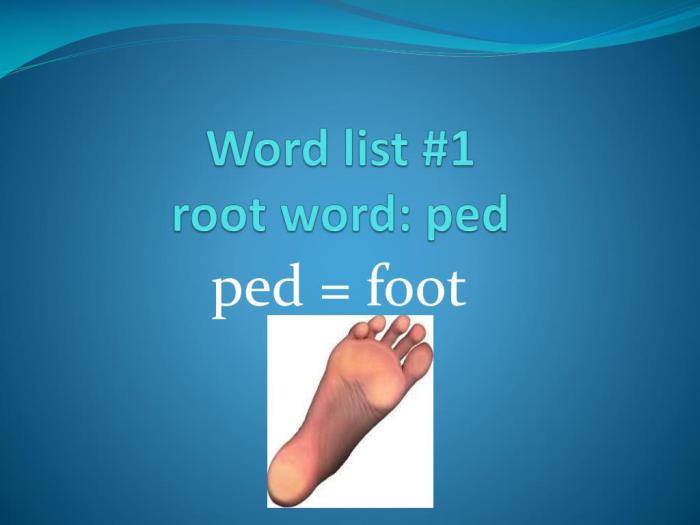Ped and pod root words – Embark on a linguistic adventure as we delve into the fascinating world of ‘ped’ and ‘pod’ root words. From their ancient origins to their modern-day applications, these etymological gems hold a treasure trove of insights into the evolution of language and its profound influence on our world.
These root words, like linguistic chameleons, adapt seamlessly to various contexts, shaping the meanings of countless words and enriching our vocabulary. Join us as we uncover the intricate tapestry of ped and pod, exploring their shared meanings, subtle nuances, and diverse usage across cultures and disciplines.
Etymology of ‘Ped’ and ‘Pod’
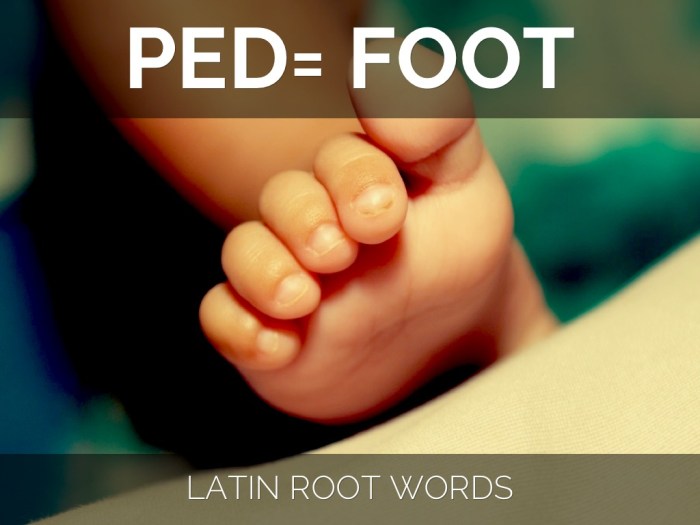
The root words ‘ped’ and ‘pod’ have Latin origins and are commonly used in English to refer to feet and similar structures, as well as to indicate the presence of a foot or foot-like appendage.
The root word ‘ped’ is derived from the Latin word ‘pes,’ meaning “foot.” It is commonly used in English to form words related to feet, such as “pedestrian,” “pedal,” and “pedicure.”
The root word ‘pod’ is derived from the Latin word ‘podis,’ meaning “foot” or “foot-like structure.” It is commonly used in English to form words related to foot-like structures, such as “podiatry,” “podiatrist,” and “podium.”
Examples of Words Derived from ‘Ped’
- Pedal: A lever or key operated by the foot.
- Pedestrian: A person walking, rather than riding in a vehicle.
- Pedicure: A cosmetic treatment for the feet.
- Pedometer: A device that measures the number of steps taken.
- Pedalboard: A board that holds and organizes guitar pedals.
Examples of Words Derived from ‘Pod’
- Podiatry: The medical treatment of the feet.
- Podiatrist: A doctor who specializes in podiatry.
- Podium: A raised platform used for speaking or conducting.
- Peduncle: A stalk or stem that supports a flower or fruit.
- Sesquipedalian: A word with many syllables.
Semantic Similarities and Differences: Ped And Pod Root Words
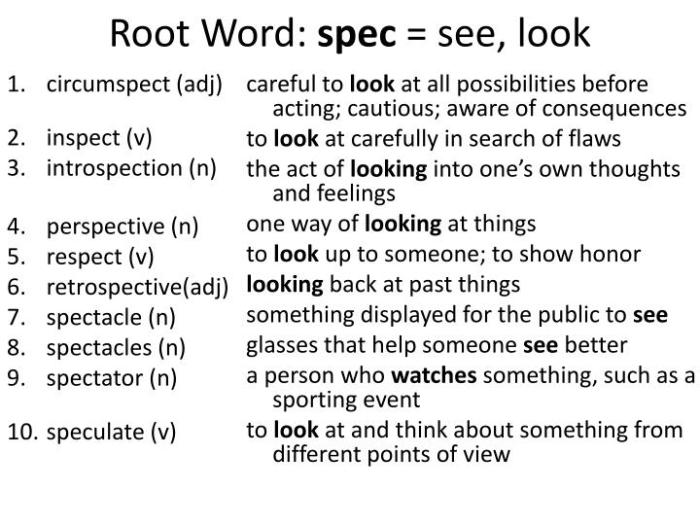
Despite their shared root, ‘ped’ and ‘pod’ exhibit both semantic similarities and nuances in their usage. They share a common theme of containment, with ‘ped’ referring to the support or foundation of something, while ‘pod’ often denotes a protective or enclosing structure.
Shared Meanings
- Foundation or Base:Both ‘ped’ and ‘pod’ can refer to a supporting base or foundation. ‘Ped’ appears in words like ‘pedestal’ and ‘pediment’, which are architectural structures that provide support or decoration.
- Enclosed Space:‘Pod’ commonly signifies an enclosed or protected space, as seen in words like ‘seed pod’ or ‘bean pod’, where it refers to the protective casing surrounding seeds.
Semantic Distinctions
Despite these shared meanings, ‘ped’ and ‘pod’ also exhibit distinct semantic differences.
- Type of Support:‘Ped’ typically refers to a solid or fixed support, while ‘pod’ often implies a more flexible or temporary enclosure. For instance, a ‘pedestal’ is a sturdy base, while a ‘pod’ might be a temporary shelter.
- Size and Shape:‘Pod’ often suggests a smaller and more rounded shape, while ‘ped’ can refer to structures of various sizes and shapes. A ‘pediment’ can be a large triangular architectural feature, whereas a ‘seed pod’ is typically small and oval.
Examples of Semantic Relationships
- Support:‘Pedestal’ (ped) supports a statue, while ‘pod’ (bean pod) supports the seeds.
- Enclosed Space:‘Pediment’ (ped) forms a triangular space above a doorway, while ‘pod’ (pea pod) encloses the peas.
- Size and Shape:‘Pediment’ (ped) is a large triangular structure, while ‘pod’ (seed pod) is a small, oval-shaped enclosure.
Use in Morphology and Vocabulary
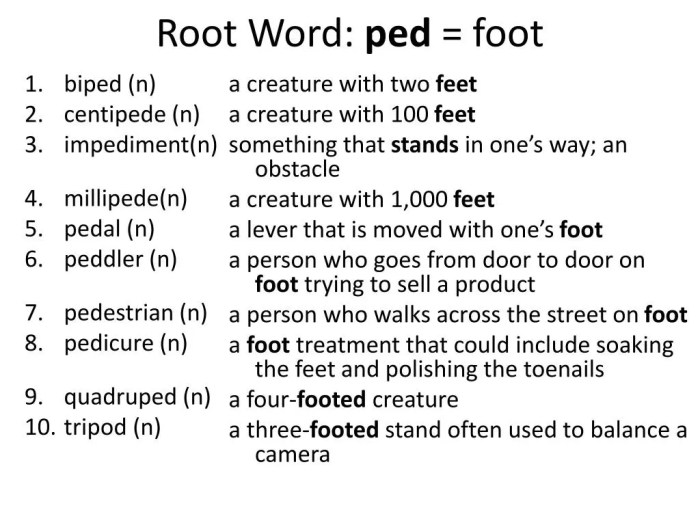
In morphology and vocabulary, ‘ped’ and ‘pod’ play distinct roles as prefixes and suffixes, shaping the meaning and structure of words.
Prefixes
- ‘Ped’, derived from the Greek word ‘pous’ meaning ‘foot’, is used as a prefix to denote relation to the foot, such as in ‘pedestrian’ (one who walks) or ‘pedicure’ (care of the feet).
- ‘Pod’, derived from the Greek word ‘pous’ meaning ‘foot’, is used as a prefix to denote a foot-like structure or container, such as in ‘podophyllin’ (a plant with foot-shaped leaves) or ‘podcast’ (a broadcast distributed via a portable device).
Suffixes, Ped and pod root words
- ‘Ped’is rarely used as a suffix, but can occasionally be found in words like ‘centipede’ (a creature with many feet) or ‘myriapod’ (a creature with countless feet).
- ‘Pod’, on the other hand, is more commonly used as a suffix, particularly in botanical contexts, to indicate a seed-bearing structure, such as in ‘peapod’ or ‘beanpod’.
| Word | Prefix/Suffix | Meaning |
|---|---|---|
| Pedestrian | Prefix (‘ped’) | One who walks |
| Pedicure | Prefix (‘ped’) | Care of the feet |
| Podophyllin | Prefix (‘pod’) | A plant with foot-shaped leaves |
| Podcast | Prefix (‘pod’) | A broadcast distributed via a portable device |
| Centipede | Suffix (‘ped’) | A creature with many feet |
| Myriapod | Suffix (‘ped’) | A creature with countless feet |
| Peapod | Suffix (‘pod’) | A seed-bearing structure of a pea plant |
| Beanpod | Suffix (‘pod’) | A seed-bearing structure of a bean plant |
Cultural and Linguistic Influences
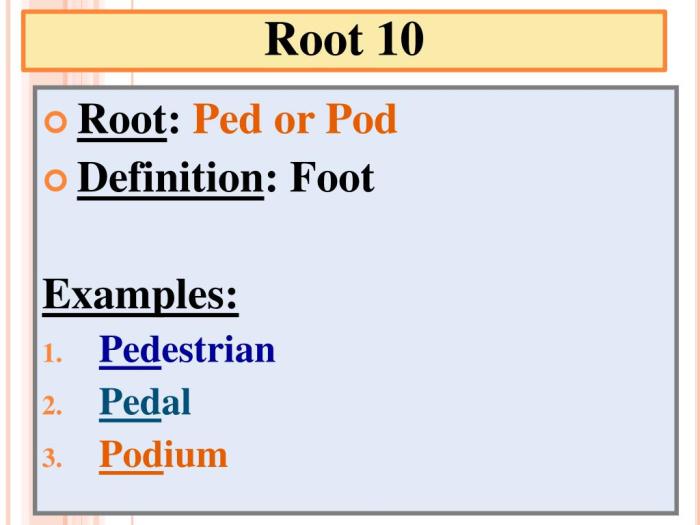
The usage of ‘ped’ and ‘pod’ has been shaped by various cultural and linguistic factors. These root words have been influenced by different languages and cultures, leading to cross-cultural variations in their usage.
For instance, in Latin, ‘pes’ (the origin of ‘ped’) refers to the foot, while in Greek, ‘pous’ (the origin of ‘pod’) also encompasses the leg. This distinction reflects the different cultural perspectives on the human body and its parts.
Ped and pod are common root words, but if you’re looking to add some numbers in Excel, you might need a little more than just roots. Check out this handy guide on How To Sum In Excel for some quick and easy tips on mastering this essential spreadsheet skill.
Now, back to ped and pod…
Cross-Cultural Variations
- In English, ‘pedestrian’ refers to someone walking, while in French, ‘piéton’ can also refer to someone on a bicycle.
- In Spanish, ‘pedal’ means both ‘foot pedal’ and ‘bicycle pedal’, while in Italian, ‘pedale’ only refers to the former.
- In some cultures, ‘pod’ is used to describe a small, enclosed space, such as a seed pod or a cocoon, while in other cultures, it can also refer to a larger, enclosed space, such as a spaceship or a submarine.
Applications in Science and Technology
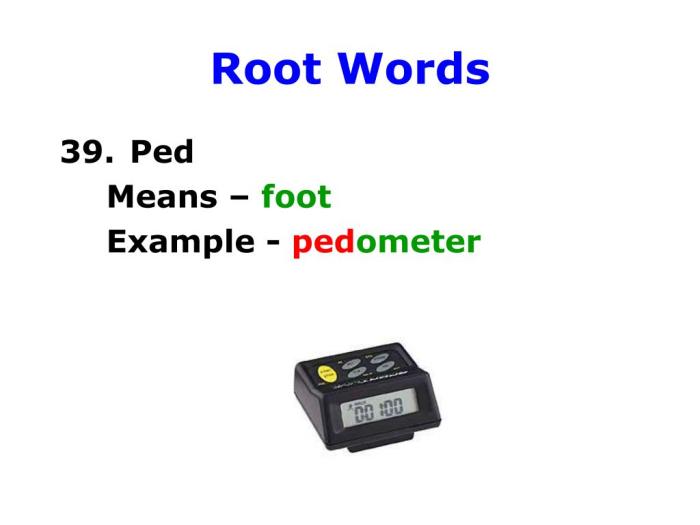
The root words ‘ped’ and ‘pod’ find extensive applications in various fields of science and technology, where they carry specific technical meanings and contribute to the understanding and development of scientific concepts and technological advancements.
Earth Sciences
- Pedology:The study of soils, their formation, classification, and distribution. ‘Ped’ in this context refers to the ground or soil.
- Pedosphere:The outermost layer of the Earth’s crust, consisting of soil and weathered rock. ‘Ped’ here signifies the ground or soil layer.
- Pediment:A gently sloping erosion surface found at the base of mountains or hills. ‘Ped’ in this term denotes the foot or base of the landform.
Biology
- Pedicel:A stalk that supports a single flower or fruit. ‘Ped’ here refers to the foot or stalk.
- Peduncle:The stalk that supports a cluster of flowers or fruits. ‘Ped’ in this context signifies the foot or stalk.
- Podocyte:A specialized cell found in the kidneys that helps filter blood. ‘Pod’ in this term denotes the foot-like structure of these cells.
Medicine and Health Sciences
- Pedal edema:Swelling in the feet and ankles. ‘Ped’ in this term refers to the feet.
- Pediatric medicine:The branch of medicine that deals with the health and care of children. ‘Ped’ here signifies the child or foot.
- Pedorthist:A healthcare professional who specializes in the assessment and treatment of foot disorders. ‘Ped’ in this term denotes the foot.
Technology and Engineering
- Pedestal:A raised platform or base used to support a statue or other object. ‘Ped’ in this context refers to the foot or base.
- Pedometer:A device used to measure the number of steps taken while walking. ‘Ped’ here signifies the foot.
- Podcasting:A method of distributing audio or video content over the internet for playback on mobile devices or computers. ‘Pod’ in this term refers to the portable or handheld nature of the content.
User Queries
What are the origins of the root words ‘ped’ and ‘pod’?
The root word ‘ped’ traces its origins to the Latin word ‘pes,’ meaning ‘foot,’ while ‘pod’ stems from the Greek word ‘pous,’ also meaning ‘foot.’
How are ‘ped’ and ‘pod’ used in morphology?
As prefixes, ‘ped’ and ‘pod’ indicate a connection to feet or walking, as seen in words like ‘pedestrian’ and ‘podiatrist.’ As suffixes, they often denote a container or enclosure, as in ‘aardpod’ and ‘cocopod.’
Can you provide examples of words derived from the root word ‘pod’?
Examples of words derived from ‘pod’ include ‘podium,’ ‘podcast,’ and ‘podiatry.’
